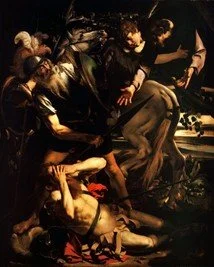Reading Luke/Acts Together #63 – Saul/Paul’s Conversion
Wow. After he’s ascended into heaven, the risen Jesus is still on the loose, changing everything. Appearing to Saul – fulfilling Martin Luther King's admonition that "Love is the only force capable of transforming an enemy into a friend." A blinding vision from heaven works pretty well too.
How momentous for the future of Christianity was the conversion of Saul (known to us by his Roman name, Paul)? His extraordinary impact on the survival, progress, scope and very definition of Christianity make Paul important person #1. Critics believe he ruined a simpler, earthier religion Jesus would have espoused; admirers believe Paul simply drew the truest, most profound conclusions about the mission and identity of Jesus.
Reared in Tarsus to be a pious Jew, Paul was “converted,” but not in the way we often think of conversion. He was not a wicked man who turned good; he was not irreligious, but super-religious before his conversion! Evidently, Jesus isn’t looking for generalized spirituality, religious diligence, or even denominational loyalty; there is a specific content to our faith, and that content is the person of the risen Christ himself! We attach ourselves to him, not our own religious inclinations.
Jesus said to him, “I am Jesus! Go into the city, and you will be told what to do,” which makes me wonder if that’s the word to us, that we discern our calling, the point of being a Christian, when we go into the city, and listen to the challenges and sorrows, the injustices and agonies of where real, and usually unchurched people live, work and play. You won’t take Jesus into the city. He’s already there.
Paul was blinded, then his eyes were opened – and this is the dramatic shift for us – from thinking we can see, realizing our inner blindness, then coming to see the reality of Christ. Paul quite literally embodies what conversion to Christianity meant: he was con-verted (meaning “turned around”), moving now in a totally new, shocking direction – and all because of his encounter with Jesus, raised from the dead, active through the Spirit on earth. Paul’s change was sudden (although it did take him a few days in Damascus and then Antioch with various helpers before he could “see”), whereas most of us may patiently meander through longer stages along the way to becoming followers of Christ.
The scales falling from his eyes – symbolic of the spiritually blind now seeing – reminds me of Puff the Magic Dragon: “His head was bent in sorrow, green scales fell like rain.” Childhood lost – so what did Paul lose when he saw the light? Plenty – and we hear the pain of his loss repeatedly in his letters: family, reputation, the security of the Law, and much more.
Ananias intrigues me. Who was it who guided you into the faith you have? Ananias says “I’ve heard about this man.” As Willie Jennings imagines it: “Saul is a killer of disciples. Do I act on a truth about someone, a truth that may put me in danger, or do I follow the word of the Lord and touch this dangerous person? Ananias goes to Saul armed with Saul’s future, not his own.” Oh my. Re-read that one. Then, “The truth we know of a person or people must move to the background, and what we know of God’s desire for them must move to the foreground.” Scales fall from Saul/Paul’s eyes – but doesn’t Ananias come to a new vision here as well?
Notice that Paul wasn’t converted just so he could get a ticket into heaven, or have a thrilling experience of God, or an enjoyable, comfortable life. For him, becoming a Christian was the most arduous life conceivable – for his turning around entailed a vocation, daunting tasks, a stunning new journey. At the very moment he met Jesus, he was given a life of work to do; Christ seems to have saved Paul, not for Paul, but for everybody else.
And so it is for us. Conversion (or having faith in God), if it means anything, is never just a great thing for me to do for myself. Faith means I listen, and God tells me where I will go, what I will do, how I will serve – and it is always personal, and with Jesus himself as our focus. And it’s a journey: notice how Acts speaks of the church as “the Way.”
Have you been converted? And where is the risen Christ calling you to go? and us to go together as the Body of Christ?
